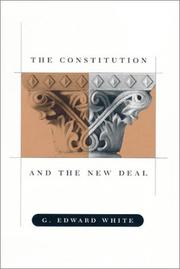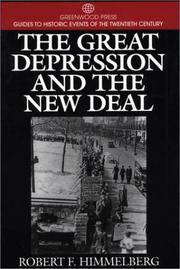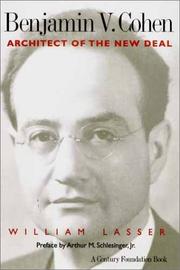| Listing 1 - 10 of 112 | << page >> |
Sort by
|
Book
Year: 1994 Publisher: Project Gutenberg
Abstract | Keywords | Export | Availability | Bookmark
 Loading...
Loading...Choose an application
- Reference Manager
- EndNote
- RefWorks (Direct export to RefWorks)
Book
Year: 2017 Publisher: [Place of publication not identified] : Great Neck Publishing,
Abstract | Keywords | Export | Availability | Bookmark
 Loading...
Loading...Choose an application
- Reference Manager
- EndNote
- RefWorks (Direct export to RefWorks)
Discusses the aspects of the second New Deal, a set of economic and social measures introduced by U.S. President Franklin Delano Roosevelt (1882-1945). Highlights these measures, which included the Works Progress Administration (WPA) and the Social Security Act of 1935. Notes that the information is part of "An Outline of American History," a resource provided online by the Department of Humanities Computing at the University of Groningen in The Netherlands.
Book
ISBN: 0300258216 Year: 2021 Publisher: New Haven ; London : Yale University Press,
Abstract | Keywords | Export | Availability | Bookmark
 Loading...
Loading...Choose an application
- Reference Manager
- EndNote
- RefWorks (Direct export to RefWorks)
A look at how the New Deal fundamentally changed American life, and why it remains relevant today";The New Deal was America's response to the gravest economic and social crisis of the twentieth century. It now serves as a source of inspiration for how we should respond to the gravest crisis of the twenty-first. There's no more fluent and informative a guide to that history than Eric Rauchway, and no one better to describe the capacity of government to transform America for the better.";—Barry Eichengreen, University of California, Berkeley The greatest peaceable expression of common purpose in U.S. history, the New Deal altered Americans' relationship with politics, economics, and one another in ways that continue to resonate today. No matter where you look in America, there is likely a building or bridge built through New Deal initiatives. If you have taken out a small business loan from the federal government or drawn unemployment, you can thank the New Deal. While certainly flawed in many aspects—the New Deal was implemented by a Democratic Party still beholden to the segregationist South for its majorities in Congress and the Electoral College—the New Deal was instated at a time of mass unemployment and the rise of fascistic government models and functioned as a bulwark of American democracy in hard times. This book looks at how this legacy, both for good and ill, informs the current debates around governmental responses to crises.

ISBN: 0674059735 9780674059733 0674003411 9780674003415 Year: 2010 Publisher: Cambridge, MA
Abstract | Keywords | Export | Availability | Bookmark
 Loading...
Loading...Choose an application
- Reference Manager
- EndNote
- RefWorks (Direct export to RefWorks)
In a powerful new narrative, G. Edward White challenges the reigning understanding of twentieth-century Supreme Court decisions, particularly in the New Deal period. He does this by rejecting such misleading characterizations as "liberal," "conservative," and "reactionary," and by reexamining several key topics in constitutional law. Through a close reading of sources and analysis of the minds and sensibilities of a wide array of justices, including Holmes, Brandeis, Sutherland, Butler, Van Devanter, and McReynolds, White rediscovers the world of early-twentieth-century constitutional law and jurisprudence. He provides a counter-story to that of the triumphalist New Dealers. The deep conflicts over constitutional ideas that took place in the first half of the twentieth century are sensitively recovered, and the morality play of good liberals vs. mossbacks is replaced. This is the only thoroughly researched and fully realized history of the constitutional thought and practice of all the Supreme Court justices during the turbulent period that made America modern.
Constitutional history --- New Deal, 1933-1939. --- New Deal, 1933-1939 --- United States --- Economic policy
Book
ISBN: 1626740097 9781626740099 9781617039577 1617039578 161703956X 9781617039560 9781617039560 Year: 2014 Publisher: Jackson
Abstract | Keywords | Export | Availability | Bookmark
 Loading...
Loading...Choose an application
- Reference Manager
- EndNote
- RefWorks (Direct export to RefWorks)
The Great Depression emboldened Americans to tolerate radical experimentation in search of solutions to economic problems. Amongst the thorniest of those problems was that of Southern poverty; indeed, FDR claimed in 1933 that Southern rural poverty was the nation's 'number one economic problem'. In 'Trouble in Goshen' Fred C. Smith focuses on three communities designed and implemented to solve that problem. This book examines the economic and social theories - and their histories - that resulted in the creation and operation of the most aggressive and radical experimentation in the United States.
Rural development --- Rural poor --- New Deal, 1933-1939. --- History
Book
ISBN: 1476621144 9781476621142 9780786498291 0786498293 Year: 2015 Publisher: Jefferson, North Carolina
Abstract | Keywords | Export | Availability | Bookmark
 Loading...
Loading...Choose an application
- Reference Manager
- EndNote
- RefWorks (Direct export to RefWorks)
As the United States struggled to recover from the Great Depression, 24 towns in Alabama would directly benefit from some of the 83 million allocated by the Federal Government for public art works under the New Deal. In the words of Harold Lloyd Hopkins, administrator of the Federal Emergency Relief Act, ""artists had to eat, too,"" and these funds aided people who needed employment during this difficult period in American history. This book examines some of the New Deal art--murals, reliefs, sculptures, frescoes and paintings--of Alabama and offers biographical sketches of the artists who cre
Book
ISBN: 1607815567 9781607815563 9781607815556 1607815559 Year: 2017 Publisher: Salt Lake City
Abstract | Keywords | Export | Availability | Bookmark
 Loading...
Loading...Choose an application
- Reference Manager
- EndNote
- RefWorks (Direct export to RefWorks)
"Marriner Eccles was a key figure in the formulation and implementation of Franklin D. Roosevelt's New Deal. Mark Nelson calls him,"one of the most important public officials in the history of the United States." Eccles might be recognized, at least by some in Utah, as one of the state's more significant twentieth-century native sons, but neither here nor elsewhere is the degree of his historical importance widely appreciated. He exercised his influence from inside the Civil Works Administration and the Treasury Department, but especially as chairman of the Federal Reserve. While previous authorized books on Eccles have been published, this is the first to examine independently his public career; his public roles, activities, and ideas. As Nelson explains early on, it is as much as anything a study of the New Deal through the person of Eccles. It is not intended as a biography per se, so there is less on Eccles's personal life and roots, and more on the roots of his philosophy"--Provided by publisher.
New Deal, 1933-1939. --- New Deal, 1933-1939 --- Eccles, Marriner S. --- Eccles, Marriner Stoddard, --- United States --- Economic policy

ISBN: 0313299072 9786610868995 1280868996 0313007187 9780313007187 9780313299070 9781280868993 6610868999 9798400659041 Year: 2001 Publisher: Westport, Conn. Greenwood Press
Abstract | Keywords | Export | Availability | Bookmark
 Loading...
Loading...Choose an application
- Reference Manager
- EndNote
- RefWorks (Direct export to RefWorks)
Business cycles --- World history --- United States --- Depressions --- New Deal, 1933-1939. --- History --- New Deal, 1933-1939 --- 1929 --- 1919-1933 --- 1933-1945 --- United States of America
Book
ISBN: 9786613911858 1283599406 073914572X 0739122398 073912238X 9780739145722 9781283599405 9780739122396 9780739122389 Year: 2010 Publisher: Lanham, Md. Lexington Books
Abstract | Keywords | Export | Availability | Bookmark
 Loading...
Loading...Choose an application
- Reference Manager
- EndNote
- RefWorks (Direct export to RefWorks)
Working people created a new America in the 1930's and 1940's which was a fundamental departure from the feudalistic and hierarchical America which existed before. In the process, class politics re-defined the political agenda of America as-for the first and time in American history-the political universe polarized along class lines. The author explores the meaning of the new deal political mobilization by ordinary people by examining the changes it brought to the local, county, and state levels in Pittsburgh, Allegheny County, and Pennsylvania as a whole.
Working class --- Labor --- Industrial relations --- New Deal, 1933-1939. --- History --- United States --- Social conditions --- New Deal, 1933-1939 --- Labor and laboring classes --- Manpower --- Work

ISBN: 1281729213 9786611729219 0300128886 9780300128888 9781281729217 0300088795 9780300088793 Year: 2002 Publisher: New Haven
Abstract | Keywords | Export | Availability | Bookmark
 Loading...
Loading...Choose an application
- Reference Manager
- EndNote
- RefWorks (Direct export to RefWorks)
A key figure in the administrations of Franklin D. Roosevelt and Harry S. Truman, Benjamin V. Cohen (1894-1983) was a major architect of public policy from the first days of FDR's presidency through the early days of the Cold War. Although he kept a low public profile, Cohen's influence extended across a wide range of domestic and foreign policy initiatives. In this biography, William Lasser offers the first account of Ben Cohen's life and career, and an assessment of his contribution to the origin and development of modern American liberalism.Cohen's life provides an extraordinary lens through which to view the development of the evolving political philosophy of the Roosevelt and Truman presidencies. A brilliant lawyer noted for his good judgment and experience, Cohen was a leading member of FDR's "Brain Trust," developing ideas, drafting legislation, lobbying within the administration and in Congress, and defending the New Deal in court. The book traces his contributions to domestic financial policy, his activities during the war years in London and Washington, his service as counselor to the State Department and member of the American delegation to the United Nations after the war, and his role in the American Zionist movement. From Cohen's life and work, Lasser draws important insights into the development of the New Deal and the evolution of postwar liberalism.
Statesmen --- Intellectuals --- Lawyers --- New Deal, 1933-1939. --- Liberalism --- New Deal, 1933-1939 --- History --- Cohen, Benjamin V. --- Cohen, Ben --- United States --- Politics and government
| Listing 1 - 10 of 112 | << page >> |
Sort by
|

 Search
Search Feedback
Feedback About UniCat
About UniCat  Help
Help News
News